12 Easy Ways to Stop Shopping
This post may contain affiliate links and Corporette® may earn commissions for purchases made through links in this post. As an Amazon Associate, I earn from qualifying purchases.

Maybe you need to curb your spending because you've discovered you owe a big chunk of money on your taxes (surprise!), you're facing credit card debt, or you're trying to grow your savings account … and you're wondering how to stop shopping. Or maybe you're trying to stick to your New Year's resolution to spend less. We haven't talked about how to control your spending in quite a while, so we thought we'd share some tips today. If you've ever had to make a change like this, what were your strategies for how to stop shopping? What was your motivation — to pay down debt, put more money into savings (or investments, etc.), or redirect the money toward a goal, such as a down payment on a house?
Here are 12 tips on how to stop shopping:
1. Use a paper chart to track your spending.
Budgeting programs such as Mint or YNAB can be useful (I use Mint), but I like this option because you can see the whole month at once and (ideally) watch those “zero” days accumulate. In the past, I've used this tracker from Frugal Mama. I randomly found it by googling “spending tracker” — and while I happen to be a mom, you can certainly find a similar non-parent chart if you don't have kids!
2. Leave your credit cards at home when you go out
Leave your credit cards at home when you go out — and perhaps only use debit for a while. (The decision to do this rests on how dire your shopping/debt situation is). The age-old “cut up your cards!” advice doesn't work for everyone; for example, you may want to keep earning rewards on your credit card (as long as you're paying off the balance each month, that is!). Also, consider the envelope method for budgeting — with cash.
{related: how to pick the best rewards card}
3. Make your money inaccessible
If you can, make more of your money inaccessible (or at least less accessible). If your financial situation allows it, increase your 401k payroll deductions at work and/or add a savings account to your direct deposit so that your paycheck isn't solely going to checking. You can also set up regular automatic savings transfers or automatic investing.
{related: how to set up automatic investing}
4. Unsubscribe from store emails
Unsubscribe from store emails and emails from sale sites (e.g., Shopstyle). Either unsubscribe to each one as you receive their emails, or use a free tool such as Unroll.me.
5. Stop delivery of mail order catalogs.
DMAChoice.org charges $2 to remove you from mailing lists for certain categories, such as catalogs, or from individual catalogs. Catalogchoice.org is free but only allows you to unsubscribe from one catalog at a time. (I've had success with the latter.)
In honor of this series' original title, Tales from the Wallet — here's a wallet we love!
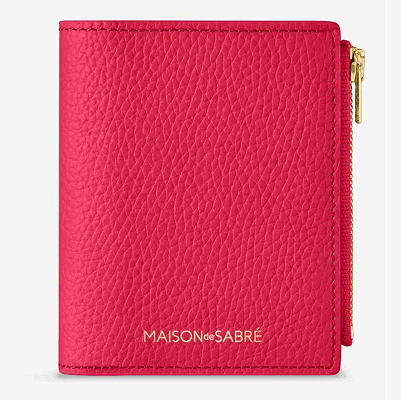
6. Delete any store apps and shopping apps from your phone.
It's even worse to have store apps and shopping apps on your phone than on your computer, because they make it so easy to shop from anywhere at any time — the doctor's office waiting room, the coffeeshop, the long line at the grocery store, etc.
7. Delete your credit card information from store websites and from your browser's autofill function.
Unfortunately, this isn't quite as effective if you, like me, have your credit card number memorized. (One of my cards was hacked recently, which was pretty annoying but had the hidden benefit of getting a new card number that I don't know by heart. Yet.)
8. When you want to buy something online, only put it in your cart at first.
(Or your wishlist — you should see my Sephora “Loves” list…) Then wait 24 hours. If you don't completely forget about the item, which is possible, you might at least find that you don't want it as much anymore and be able to convince yourself to skip the purchase … or at least delay it some more.
9. Clean out your closet.
You're more likely to feel good about what's in there (and therefore feel fewer “I need new clothes!” urges) if you ditch the pieces you don't really like — the ones you always skip over when you're deciding what to wear in the morning. You can also shop your closet to try new combinations you haven't thought of before.
{related: decluttering your wardrobe & where to recycle, donate, and sell your work clothes}
10. Try a capsule wardrobe.
You may gain new appreciation for the clothes you already have — and also distract yourself from shopping by having fun putting new outfits together. Also, consider trying our Work Outfit Challenge — sign up for the emails today!
{related: creating a capsule wardrobe for work}
11. Tailor your clothes to make what you already have work for you.
If you have clothes lying around that you've been meaning to get tailored, do that now. Sure, you'll have to spend some money, but unless you're asking for major alterations, it'll still be cheaper than buying new clothes. (We've had lots of posts on getting your clothes tailored!)
12. Organize a clothes swap with friends.
I've never tried this, but it sounds fun, and it's a free way to get some new pieces — maybe some styles you never would have picked up at the store but discover that you really like. The Simple Dollar has some tips, and depending on where you live, you may have access to the events organized by ClothingSwap.com. I am kind of intrigued… (After their events, they donate unclaimed items to charity.)
What are your tips on how to stop shopping? If you've ever tried to cut down, what worked and what didn't?
Stock photo (woman with bags) via Shutterstock/wavebreakmedia. Other images via Stencil.
These are some of our latest favorite financial books for beginners:

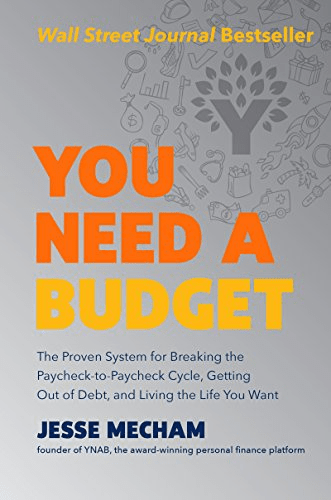
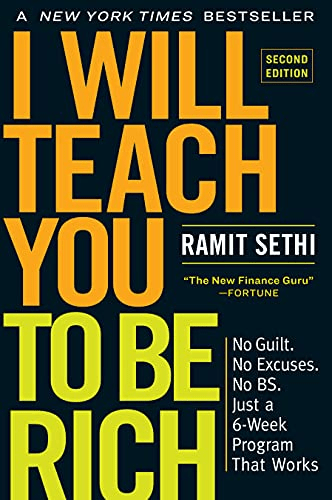
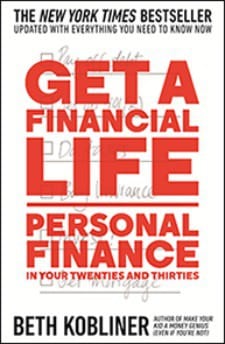
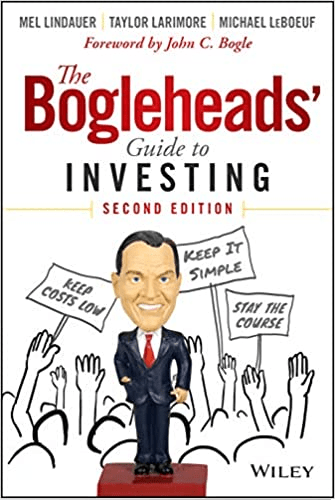

This isn’t exactly a tip I’d recommend, per se, but I… just don’t care as much about how my clothes look as I used to. I think it’s a mix of just getting older and shifting my lifestyle/priorities, going out less, moving to the suburbs, working from home more, and the fact that even when I do go into the office, my colleagues aren’t particularly fashionable so I don’t feel inspired to dress up. In my early 20s when I worked in the city with lots of stylish colleagues and had a more variable social life, I shopped more and had a (probably) more interesting closet. I miss those days but my bank account is happier now.
I wish I could be more like you. I am getting older now so mabye I can stop caring as much, but I DO need to look good to my cleints as well as the court, when I go to argue my brief’s. I just love to get home and change into my PJ’s and just watch TV and eat and not care what I look like! YAY!
This is similar to me. I love clothes and enjoy fashion, but after getting married and having a kid, and generally getting older, I realized there are just some clothes I don’t need because they don’t fit my life anymore. I don’t need a million “going out” dresses when we only get “out” every other month, if that. There are some pieces I like and would still look good in that I would have worn five years ago that I won’t buy now because I want to project a different image. There are some things I would wear out of town (“vacation clothes”) that I rarely purchase because I don’t get any use out of them in my every day, real life. This has curbed a lot of shopping for me.
I have always been a big proponent of not impulse buying things. If I still think about it days later, in a different mood and with a different level of stress, it is almost always something I like having.
I am also a proponent of knowing when enough is enough. My winter wardrobe is great. I need a few summer pieces. Have enough heels. The effort to find nice, flattering pieces paid off – I don’t need “more” or “better.”
For me, I also try to identify whether there is a psychological driver to my shopping (online in particular). Am I anxious about work and avoiding it by shopping? Am I looking forward to a trip and could plan day excursions instead? Understanding if there is another driver other than the shopping itself can be more effective than just making the funds less accessible (which might only further fuel the urge).
I go through my closet and realize all I own that I don’t wear… and I’m a minimalist! When I realize that, it makes me better at deciding to either treat unworn clothes as new items in my closet (no need to shop, look at all my new stuff!) or at realizing I have made a bunch of purchases of stuff I didn’t care about enough to wear after all (you don’t always make good choices, no need to shop and make more purchases you won’t wear!). This also helps me in the future when I do shop to be more mindful of not impulse buying, not buying something only kinda okay (even if/especially if it’s on sale). Plus ridding my closet of stuff I don’t wear means I get to put it out there for those who would wear it but maybe can’t afford it. I’ve been the person buying 2nd hand clothes and thrilled someone gave away or cheaply sold something I love and could never have afforded new, so I like giving that feeling to others!!
Marie Kondo helped me with my shopping habit. It made me so sad to get rid of so many clothes, and I still have more clothes than space. If I try the “does it spark joy” test on that thing I’m about to buy, 90% of the time, I don’t click Check Out.
That said, darn you, whoever pointed out the 50% off Anthropolgie sale today! I have some joy sparking over there…
I find it useful to quantify “not shopping” so I can track actual results of my behavior. Not doing something doesn’t feel very active, or motivating. If I resist a pair of shoes and instead repair some old pairs and get new heel caps, I’ll log a note in my financials about the cost of repair, the cost of what I wanted to buy, and then move the difference to savings.
This may sound weird but I hang my work clothes in outfits, not filed by category. When I see the line up I know I have plenty to wear. I also make a list of the categories where I don’t need anything that season— so “No more sweaters or pumps” was on my list for Fall. I also make a list of what I do need, and try to shop the list when I have time. Then things are arriving but they are more likely to be things I need.
I don’t buy new shoes unless I have room for them, so I give shoes away if I’m buying new. The problem I’m having now is that I was virtually starting from scratch. I went from a size 16-18 to a 6-8. I have to replace everything, even some of the clothes I bought just a few months ago (although I tried not to buy too much as I went along). A friend is right behind me and now a 12, so I’m giving a lot to her, including shoes (even my shoe size is smaller). I’ve probably bought too much, but I still don’t have some basics, like tanks or tees, or even skirts. I just need to stop buying dresses!
One of the most helpful tips I’ve read for resisting sale items is to ask yourself: Would you buy this if it were full price? Most of the time the answer is no. That helps filter out things you don’t really need/want that are made really tempting by a great sale price. It’s not a “great” price if you didn’t really need it and don’t end up using it.